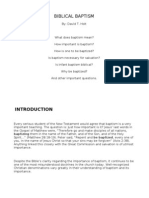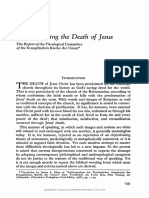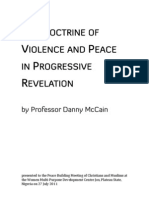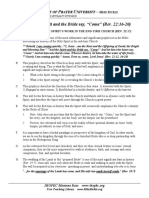Baptism What The Bible Teaches
Baptism What The Bible Teaches
Uploaded by
Razelle OlendoCopyright:
Available Formats
Baptism What The Bible Teaches
Baptism What The Bible Teaches
Uploaded by
Razelle OlendoOriginal Description:
Original Title
Copyright
Available Formats
Share this document
Did you find this document useful?
Is this content inappropriate?
Copyright:
Available Formats
Baptism What The Bible Teaches
Baptism What The Bible Teaches
Uploaded by
Razelle OlendoCopyright:
Available Formats
Baptism what the Bible teaches
"Jesus answered, 'Truly, truly, I say to you, Unless a man is born of water and the Spirit, he cannot enter into the kingdom of God." (John 3:5) "Therefore go and teach all nations, baptizing them in the name of the Father and of the Son and of the Holy Spirit" (Mat 28:19)
These two Gospel verses, both quoting Jesus Christ, form the basis for the Christian practice of Baptism. There is no quicker way to generate controversy among a large gathering of Christians than to start a discussion about baptism. Beliefs on the subject vary among denominations, churches, etc. Yet, we are told in Holy Scripture, Ephesians 4:4-6 - - "There is one body and one Spirit, even as you are called in one hope of your calling, one Lord, one faith, one baptism, one God and Father of all, who is above all and through all and in you all." These verses of the Bible clearly state, 'one Lord, one faith, one baptism, one God.' So why are there different beliefs concerning baptism? Because, there are varying interpretations of what Jesus meant by these verses. They are often interpreted on a stand-alone basis, without considering the complete context of the Holy Bible. Using Effective Bible Study techniques, let's consider what the Bible teaches about baptism. (Note: This page deals with baptism from a Scriptural perspective, setting aside church & denominational dogma. It is not an anti-baptism site, as you will find by reading through to the end of the study.) What does the word 'Baptism' mean? In the original manuscripts of Scripture, all the various forms of the word baptize are translations from the Greek word 'baptizo', which comes from the root word 'bapto'. The usage of these words according to Greek Scholars is: -- 'bapto' -- (1) to whelm, i.e. cover wholly with a fluid; -- (2) in the New Testament only in a qualified or special sense, i.e. (literally) to moisten (a part of one's person). -- 'baptizo' -- (1) to immerse, submerge; to make whelmed (i.e. fully wet); -- (2) used only (in the New Testament) of ceremonial ablution. As you can see, the meaning depends upon the context of the entire passage where the word is used, for it can mean immersion, moistening, or ceremonial washing. This is what fuels the controversy between 'sprinklers' and 'dippers'. (More on that subject as we progress) What does Baptism do? What is its effect? In the matter of salvation, the pure and simple answer is, "It gets you wet, in one way or another!" There are two diverging beliefs among Christians, concerning baptism. One teaches 'baptism before salvation', while the other teaches 'salvation before baptism.' It doesn't matter what your church, denomination, or group teaches; because there is only one Biblical teaching on the subject. Because Jesus was baptized and then the Holy Spirit came upon Him and due to His placing water before the Holy Spirit in John 3:5, it is reasoned by some, that salvation is the result of baptism. This is faulty biblical reasoning, since we find verses in the Bible such as: - - "For by grace you are saved through faith, and that not of yourselves, it is the gift of God, not of works, lest anyone should boast. " (Eph 2:8-9) - - "-in whom also you, hearing the Word of Truth, the gospel of our salvation, in whom also believing, you were sealed with the Holy Spirit of promise," (Eph 1:13) - - "For I am not ashamed of the gospel of Christ, for it is the power of God unto salvation to everyone who believes, to the Jew first and also to the Greek." (Rom 1:16) - - "and that from a babe you have known the Holy Scriptures, which are able to make you wise to salvation through faith in Christ Jesus. "
(2Ti 3:15) Scripture proclaims it is 'Faith (belief)' in Jesus Christ, given through God's Grace, that brings salvation. Clearly, the Bible teaches that baptism before belief is a useless gesture! - - "He who believes and is baptized will be saved, but he who does not believe will be condemned." (Mar 16:16) If you do not truly believe, or are incapable of belief, in Jesus Christ, baptism means absolutely nothing! The baptism of infants therefore carries no spiritual significance, since they are incapable of belief. Infant baptism is really nothing more than the parents choosing to symbolically dedicate the child to God. Is there Salvation without baptism? Many teach that the answer, in every case, is a resounding, 'NO!' Referring to Scripture verses such as John 3:5 & Mar 16:16, it is maintained that unless a person is baptized they cannot be saved. There are a great deal of biblical contradictions this belief would generate IF it were true. - We find the following account of one of the thieves crucified with Jesus in the Gospel of Luke (23:42-43), - - "And he said to Jesus, Lord, remember me when You come into Your kingdom. And Jesus said to him, 'Truly I say to you, Today you shall be with Me in Paradise." Without a doubt, the thief received the gift of Salvation. There was no water baptism; but there was an 'immersion' in Jesus Christ through belief. - The Bible teaches that salvation is an act of God. - - "For by grace you are saved through faith, and that not of yourselves, it is the gift of God, not of works, lest anyone should boast." (Eph 2:8-9) - - "So then it is not of the one willing, nor of the one running, but of God, the One showing mercy." (Rom 9:16) This contention would relegate Jesus' sacrifice on the cross to merely being an adjunct to baptism. The belief that baptism is an absolute necessity for salvation presents a very grave contradiction to Scriptural teaching, which teaches that salvation is by God's Sovereign Grace. Since water Baptism is something that man chooses, it is an act of man. To believe, and teach, that 'you must be baptized to obtain salvation' makes salvation an act of man, not of God! This in effect, proclaims that man is more powerful than his Creator! We also find the following Biblical verses, in Acts 10:44-45 - - "While Peter was still speaking these words, the Holy Spirit fell on all those hearing the Word. And those of the circumcision, who believed (as many as came with Peter), were astonished because the gift of the Holy Spirit was poured out on the nations also." And Eph 1:13 - - "-in whom also you, hearing the Word of Truth, the gospel of our salvation, in whom also believing, you were sealed with the Holy Spirit of promise-" The teaching is clear, 'the Spirit quickens + you hear the Word + you believe the Word = You are sealed with the Holy Spirit. Which according to 1Co 3:16 means, - - "Do you not know that you are a temple of God, and that the Spirit of God dwells in you?" To contend that without baptism there is no salvation again raises serious contradictions to the Bible's teaching. As already established, water baptism is an act of man. If there were no salvation without water baptism, it again would make man more powerful than his Creator, Almighty God. It would mean that man has the power to remove the seal placed on him by God and that man has the power to evict the Holy Spirit. For further study on what the Bible teaches about the act of being saved visit The Biblical Process of Salvation and Acts 10, Cornelius & his household. It would belittle the pain, suffering, death, amp; resurrection of Jesus Christ. IF baptism is necessary for salvation, it would mean that Jesus' sacrifice was not sufficient to grant salvation.
What about John 3:5? Jesus states in John 3:5, that a man must be born of water and the Holy Spirit to enter heaven. To understand this verse it is necessary to consider, who Jesus was speaking to. We know from verse 4, that He was speaking to Nicodemus, who was a Pharisee, a member of the Sanhedrin, and a Scriptural Scholar & teacher. The word 'water' was often used in the Scriptures figuratively, and metaphorically, to mean the "Grace of God" see Eze 36:25, for an example. Being a Scriptural authority, this was something that Nicodemus could be expected to understand. Interpreting John 3:5 in the entire context of Scripture shows, that this is the correct interpretation. - - "For by grace you are saved through faith, and that not of yourselves, it is the gift of God" What Jesus said to Nicodemus was, 'a man must be born of God's Grace & the Holy Spirit to see the Kingdom of Heaven (Paradise). To further prove this interpretation, consider the thief in Luke 23:42-43. The thief believed [God's gift of Grace] and calling Jesus 'Lord' asked Him to remember him when Jesus came into His Kingdom [Inspiration of the Holy Spirit]. Jesus told him he would be with Him in Paradise [Salvation]. What is Baptism? According to the teachings of Holy Scripture, it is merely an outward sign of our spiritual rebirth by the 'quickening' of, regeneration by, the Holy Spirit, through being washed in the Blood of Jesus Christ. That is the only significance of Baptism. It holds no special power and grants no spiritual gifts, or guarantees. Then, "Why be Baptized?" The answer to this question is the answer to, What is a Christian? By definition, 'a Christian is a follower, and emulator, of Jesus Christ'. - - "he who does not take up his cross and follow Me is not worthy of Me." (Mat 10:38) 'Follow' is interpreted from the Greek manuscripts word 'akoloutheo', which in this usage means - 'to be in the same way with.' (Figuratively, to walk in someone else's shoes.) A follower of Jesus Christ believes what He believes & teaches, and emulates His life. We are told in the Bible (Mat 3:13, Mar 1:9, Luke 3:21), that Jesus sought out John, the Baptist, and was baptized. Why was the Son, God incarnate, baptized? - - "And He who sent Me is with Me. The Father has not left Me alone, for I always do those things which please Him." Being Christian, means following the Christ's example. That baptism has a part in the Church founded by Jesus Christ, is evidenced by, - - "After these things Jesus and His disciples came into the land of Judea. And He stayed there with them and baptized." (John 3:22) - - "Therefore go and teach all nations, baptizing them in the name of the Father and of the Son and of the Holy Spirit." (Mat 28:19) A true follower of Jesus Christ will be baptized with water, unless circumstances completely beyond their control prevent it. Our Lord & Savior set the example and established water baptism as an ordinance of His Church. - - "He who believes and is baptized will be saved, but he who does not believe will be condemned." (Mark 16:16) Jesus places the major emphasis on 'belief' in this verse. He also showed us that, 'true belief leads to baptism'. "Dipping" vs. "Sprinkling" One group will tell you that 'believer's baptism' is only accomplished by immersion. The other says that moistening the forehead is acceptable. We have seen previously in this study that 'baptize' can mean immersion, moistening, or ritual washing. Personally, I wanted baptism by immersion; because that's the way I believe the Bible teaches it should be done. The disagreement between 'dippers' and 'sprinklers' is reminiscent of the Pharisee's of Jesus' time. Being more interested in the form of the law, than in its meaning, they claimed spiritual superiority over everyone else, maintaining that their method was the only one acceptable. Any reader of the Bible knows what Jesus said about them and their actions. The important thing about baptism is, 'what it is symbolic of, not if it is done by immersion in water or sprinkling with water.'
Baptism was symbolized in Levitical Law by ablution, ritual washing. Scripture tells us that Jesus was in the river Jordan. - - "And Jesus, when He had been baptized, went up immediately out of the water." (Mat 3:16) The implication is clearly that He was most probably completely immersed, 'whelmed', in the river. Yet, depending upon how you interpret the verse, it could simply mean that Jesus was standing in the river for ritual ablution, or to have water poured over Him. That baptism is to be by water is clearly established in the Bible. The method can be interpreted either way. Shouldn't we be more concerned with its symbolic meaning, than with a legalistic dispute over the method.
Infant Baptism and the Bible: Should Babies Be Baptized? Some denominations baptize babies, but other groups teach that baptism is only for those who are old enough to make a personal choice based on their own faith and repentance. Does the Bible authorize infant baptism or does it teach personal responsibility and individual accountability? Are infants born guilty of original sin and inherited depravity? What does the gospel of Jesus Christ teach? Introduction: Jesus clearly commanded people to be baptized (Matt. 28:18-20), yet there is much disagreement about who should be baptized. Some religious groups baptize babies. But other people say that, before one is baptized, a person should be old enough to accept the responsibility to make his own decision whether or not to be baptized and to live the Christian life. That is, they teach individual responsibility and personal accountability. The purpose of this study is to learn what the Bible says about infant baptism. We begin with an important basic principle: In order to participate in a religious practice with God's approval, we must find New Testament teaching authorizing that practice. Everything we do in religion must be done by Jesus' authority (Col. 3:17). The Scriptures provide us to all good works (2 Tim. 3:16,17), so if a practice is not included in God's word, it must not be a good work. If a practice is not authorized in the New Testament, then it must be human in origin and therefore not pleasing to God (2 John 9; Gal. 1:6-9; Matt. 15:9; Prov. 14:12; etc.) According to these Scriptures babies should be baptized only if we can find statements in the New Testament that show that God wants us to practice this. To prove infant baptism is unacceptable, we do not have to find a passage that expressly forbids the practice. Rather, if the Bible tells us specifically who to baptize, and if infants are not included in those instructions - i.e., if the gospel teaches individual responsibility and personal accountability - then the practice of baptizing babies should be abandoned. Part I: Can Babies Meet the Conditions that Must Precede Baptism? The Bible reveals that a person must do certain things before he can be baptized. If these things are not done, then the baptism would not be Scriptural. So we ask whether or not a baby can fulfill the Scriptural prerequisites of baptism.
Note that God is no respecter of persons (Acts 10:34,35; Rom. 2:11), so there are not two sets of prerequisites for baptism - one for babies and one for adults. Whatever the Bible requires of some people to be baptized, it requires the same of all people. A. Before Baptism One Must Hear and Understand the Gospel. Mark 16:15,16 - All who are baptized, must first have the gospel preached to them. But what good would be done by preaching to a baby? John 6:44,45 - No one can come to Jesus without being taught from the Father. This does not just mean simply hearing sounds. One must "learn"; he must understand the meaning of what is being taught. Can babies do this (cf. 1 Cor. 14:20)? Acts 2:36,41 - This example shows what it means for people to learn the gospel before they are baptized. The people were given evidence that Jesus is God's Son (v14-36). They were told that, on the basis of this evidence, they must "know assuredly" that Jesus is Lord and Christ (v36). Those who were baptized were those who gladly received this message (v41). Can babies hear and learn in this way? B. Before Baptism One Must Believe the Gospel. Mark 16:15,16 - Every creature who is baptized must first believe the gospel which they have been taught. Baptism is only for those who are capable of hearing and believing the gospel. No one is included in the command if they cannot first hear, understand, and believe the gospel. Can a baby do these things? Galatians 3:26,27 - However many people are baptized, all of them must do so by faith. Everyone who is baptized must first understand the gospel well enough to believe it. Acts 8:12 - When the people of Samaria gave heed to the gospel that was preached (v5,6), both men and women were baptized. When were they baptized? When they believed, not before. Can babies believe? If not, they should not be baptized until they do believe. In all Bible examples of baptism, people were baptized only when they personally had full faith, based on their own understanding of the gospel. Never were they baptized on the basis of someone else's faith, such as their parents. No one else can believe for us, just like no one can be baptized for us. [See also Acts 8:36-39; 18:8; Rom. 1:16; 10:13-17.] C. Before Baptism One Must Repent of Sins. Acts 2:38 - Every person who is baptized ("every one of you") must first repent. Repentance is a change of mind - a decision to turn from sin and begin to live for God (cf. Matt. 21:28,29). This decision involves a commitment to put God first, and to live all our lives faithfully serving Him. Note that the person who is baptized is the same person who must first repent. This is a personal choice. No one else can make this decision for us. Can a baby make this choice? (Note that we will see later that babies do not even have any sins to repent of.) Some people claim that "children" in v39 means babies are included in those to whom this "promise" was made. But "children" simply means offspring, regardless of age (note Matt. 3:9; 10:21; 21:28; John 8:39). The "promise" here is for those who repent and are baptized (v38); but babies cannot repent, nor can they do other things required in the context (v36,40,41,42). The "promise" to the "children" was fulfilled when they were old enough to do what God requires, not while they were babies.
[See also 2 Cor. 7:10; Mk. 1:4,5.] D. Before Baptism One Must Confess Christ. Romans 10:9,10 - To be saved, one must believe in his heart and confess Christ with his mouth. How can a baby confess Christ when it cannot even speak? Acts 8:35-39 - Here is an example of confession before baptism. The candidate for baptism must make an understandable statement, so that the one who does the baptizing knows they are baptizing someone who has faith. Babies cannot communicate regarding their faith in any understandable way, therefore it is not Scriptural to baptize them. Churches that baptize babies often have a practice called "confirmation." People are baptized as babies, but later when they get old enough to understand and make their own choice about serving God, they are taught and are asked to publicly "confirm" their faith and their desire to live for God. The very existence of such a practice is an admission that the child did not understand, believe, and repent before he was baptized. We have now learned four things which the Bible says every person must personally do before he can be baptized. God is no respecter of persons, so the plan is the same for everyone. Before anyone can be baptized, he must hear and understand the gospel, believe it, repent of sins, and confess Christ. Little babies cannot do any of these things. Therefore, the command to be baptized is not addressed to them. To baptize them anyway would be to act without God's authority. It would be doing something different from what God says must be done.
Part II. Can Babies Be Baptized for the Right Reason?
A. Each Individual Is Responsible to Serve God from Proper Motives. Romans 6:17,18 - To be freed from sin, one must obey from the heart the teaching delivered. This includes obedience in baptism (v3,4). God is pleased only when we serve Him from the willing choice of our own hearts. Our acts of service are valueless if someone else forces them upon us against our will or without our consent. Acts 2:40,41 - People were commanded to be saved, and they responded by being baptized. Each individual personally made his own decision. No one else can obey God for us, and no one else can make that choice for us. Other people may teach and encourage us to obey God, but they cannot decide for us whether or not we will obey. This includes obedience in baptism. Since a baby cannot possibly make this decision and cannot communicate any such decision to us, to baptize it anyway would violate God's law of personal responsibility. [See also the notes below on Ezek. 18:20 and 2 Cor. 5:10. Cf. Rom. 2:28,29; 1 Pet. 1:22; 3:21; 2 Cor. 8:5; Rev. 22:17; Phil. 2:12; 1 Cor. 13:1-3.] B. Each Person Should Be Baptized for the Purpose of Receiving Forgiveness of Sins. Again, since God is no respecter of persons, the purpose of baptism must be the same for all who are baptized. He did not give two different purposes, one for adults and another for babies. What are the proper purposes for which all must be baptized?
Mark 16:16 - He who believes and is baptized will be saved. Acts 2:38 - Repent and be baptized for the remission of sins. Acts 22:16 - Be baptized and wash away your sins. 1 Peter 3:21 - Baptism also now saves us. As shown above, our service to God pleases Him only if it is offered from the right motive and purpose. So the person who is baptized must do it for the purpose of being forgiven or saved from his sins. Consider the Lord's Supper as an illustration. Even if a person does the right actions, but if his reasons are wrong, he displeases God (1 Cor. 11:23-29). Likewise, if a person is baptized, but if he does not do it to receive forgiveness of sins, then the baptism is not Scriptural. But a baby cannot understand the meaning of baptism, so how can he be baptized from a proper motive? (See the links at the end of this study for further information about the purpose of baptism.) C. A Baby Cannot Be Baptized to Receive Forgiveness, because It Has No Sins to Be Forgiven. Since baptism must be done for the purpose of receiving forgiveness of sins, a baby could Scripturally be baptized only if it was guilty of sins and needed forgiveness. But is a baby guilty of sin? How could a baby become guilty of sin? We become sinners when we transgress God's law (1 John 3:4; James 1:13-15; Isa. 59:1,2). But a baby cannot understand God's law, so how could it be held accountable for violating it? Some people believe that babies need baptism because they have inherited guilt from Adam. But consider: Ezekiel 18:20 - The child does not bear the iniquity of the father, but the wickedness of the wicked is upon himself. The only person held accountable for Adam's sin is Adam, not his descendants. 2 Corinthians 5:10 - Each one will be judged according to what he has done in the body, good or bad. This means no one will be condemned for Adam's sin, except Adam! Note that this also confirms that no one will be justified because someone else decided to do good. Specifically babies are not held accountable for a parent's decision to have a child baptized. Each person will be judged for what he chooses to do, not for what others choose to do. Further, the Bible says that Jesus was without sin (Heb. 2:14,17; 2 Cor. 5:21; 1 John 3:5). How could He have been without sin if babies inherit the guilt of Adam's sin? If a baby is guilty of sin, what happens if it dies before it is baptized, or if its parents refuse to baptize it? If babies are guilty of sin, if one dies without baptism, then wouldn't it follow that he is eternally lost? Almost no one will accept this conclusion, yet to deny the conclusion is to admit that babies really are not guilty of sin. Further, since baptism is essential to salvation, if a baby is a sinner, then its salvation from sin must depend entirely on the actions of others. It must rely entirely on its parents to choose to baptize it. It has no choice in the matter, and
cannot possibly influence its own destiny. This contradicts all the scriptures we have quoted showing that salvation is a matter of individual choice (2 Cor. 5:10; etc.). Since salvation is a matter of individual choice, and since a baby cannot choose or express a choice to be baptized, we conclude that the baby is not lost to begin with. Therefore it does not need baptism. What condition is a baby in? Since we now know that babies have committed no sin and have inherited no sin, it follows that they must be innocent. Notice other Scriptures that confirm this conclusion: Psalms 106:37,38; Jeremiah 19:4,5 - Babies sacrificed to idols were "innocent." Hebrews 12:9 - God is the Father of our spirits, in contrast to human fathers (fathers of our flesh). Adam was a father of our flesh, but not of our spirit. God is the Father of our spirits. Would God give us sinful spirits? [Zech. 12:1; Ecc. 12:7] Matthew 19:14; 18:3 - The kingdom is for those who are like little children. To enter the kingdom, we must be converted and become like little children. If children are sinners, would this not mean that we must be converted and become like little sinners? Yet other passages show that to enter the kingdom we must become innocent or cleansed of sin (Col. 1:13,14). Therefore, becoming like little children must mean, among other things, that children are innocent. But since Jesus said to let little children come to Him, some people say this means we should baptize babies so they can come to Him. But Jesus did not baptize the babies who came to Him. They came into His physical presence so He could touch them and pray for them (Matt. 19:13; Mark 10:13-16), not so He could baptize them. They were already acceptable to Him just as they were, without baptism. A baby does not need forgiveness because he is not guilty. He is in a safe condition, not accountable for sin until he is old enough to be able to understand and accept the responsibility to obey God. Since baptism is for the remission of sins, and since a baby has no sins, it follows that babies do not need baptism. Some people admit that babies have no sin, but they baptize them anyway as a "dedication" to encourage parents to train the child properly. But where does the Bible say this is the purpose of baptism? The purpose of baptism is to receive remission of sins. And furthermore, we have learned that no one can decide that another person will be dedicated to God. Each person must decide that for himself. So no matter how you look at it, infant baptism perverts the purpose of baptism.
Part III. Can Babies Make the Commitment that Baptism Requires?
When a person is baptized, he is making a commitment to live all the rest of his life according to the Bible. He automatically and immediately becomes subject to certain responsibilities that the Bible requires of all baptized people. A person should not be baptized unless he understands this commitment and makes it freely of his own choice.
Here are a few of the responsibilities that God requires baptized people to learn to fulfill. Can babies understand this commitment and make it freely of their own choice? A. Baptized People Should Learn to Exhort and Encourage Other Christians. 1 Corinthians 12:13,25,26 - Note first that baptism makes people members of Jesus' body, which is the church (Eph. 1:22,23; 5:23). Some people baptize babies, but still do not consider them to be members of the church. God's word says that, when one has been Scripturally baptized, he is automatically in the church. Then all members in the church should care for, suffer with, and rejoice with other members. Can a baby learn to do this? [cf. Heb. 10:22-25] Ephesians 4:16 - In the body (the church) every joint and each part is to work to edify and build up the body. Can babies understand this responsibility and commit themselves to learn to fulfill it? If not, then they should not be baptized into the body. B. Baptized People Should Learn to Worship God. Acts 2:38-42,47 - Note again that, when people were baptized, the Lord added them to His church (v41,47). To baptize people and yet consider them not fully members of the church would be unscriptural. These baptized people then continued in the acts of worship named: breaking bread, prayer, the apostles' doctrine, etc. Can babies do this? 1 Corinthians 14:15-20 - Members of the church (this includes all baptized people - 1 Cor. 12:13) are to assemble with other Christians to sing, pray, and teach. All this should be done with understanding. But the Scripture expressly says that babies cannot do these things with the understanding that God requires (v20). Notice the passage carefully: Members of the church should understand what is done in worship. Babies cannot understand. Therefore, babies should not be baptized into the church! 1 Corinthians 10:16,17; 11:23-29 - All members of the body (i.e., all people who are baptized - 12:13) should eat the bread and drink the cup in communion (10:16,17). Do churches that baptize babies have them partake of communion? When members partake, they must remember Jesus' death and discern the meaning of it. If they eat without understanding, they eat and drink damnation to themselves (11:23-29). Can babies remember and discern this? If not, they should not partake. But all members of the body should partake, therefore babies should not be baptized into the body! Clearly, God requires all members of the church to make a commitment that babies cannot make. Therefore, the command to be baptized is not addressed to babies and does not include them. C. Baptized People Should Put God First in Their Lives. Romans 6:3,4,11-18 - When people are baptized, they come into Christ and should walk in newness of life. They are made alive to God (newness of life), so they must not let sin reign in their bodies, but must use their members as instruments of righteousness. Obeying the gospel makes us free from sin and slaves to righteousness. But babies cannot make such choices and commitments. They should not be baptized until they are able to accept this responsibility from their own hearts. Romans 12:1,2 - This passage is addressed to "brethren" - i.e., children of God, members of God's family, the church. But people become children of God, born again as brethren in the family, when by faith they are baptized (Rom. 6:3,4; Gal. 3:26,27; 1 Tim. 3:15). Such people should present their bodies as living sacrifices to God, not being conformed to the world. This commitment must be accepted by one who is baptized. Can babies make such a commitment?
1 Corinthians 15:58 - Brethren (i.e., people who became children of God at the point of baptism) should be steadfast, immovable, always abounding in the Lord's work. If one is not able to understand this commitment and make it freely, he should not be baptized. Can babies understand and make this commitment? Matthew 28:19,20 - Baptized people should be taught to obey all Jesus' commands. This shows that it is not necessary, at the very point of baptism, for people to know all the specific commands they must obey after baptism. But they must be capable of learning those commands. And they must have a heart willing to accept by their own free will everything Jesus says. This is the commitment that a person makes when he repents and is baptized. No one should be baptized unless he has made such a commitment. A baby cannot do this, so he should not be baptized until he is old enough to choose for himself to do so. Note carefully that we have learned what God says people must do before they can be baptized, during baptism (the proper purpose), and after baptism. And babies do not qualify in any of these areas. To baptize babies, then, would be to act by human authority without God's authority, thereby violating the will of God. And, by studying what Scriptural baptism involves, we have not only shown why babies should not be baptized, but we have also show how people should be baptized properly.
Part IV. Can Infant Baptism Be Scripturally Defended?
Remember that practices displease God unless they are authorized in His word (see our introduction). We now know that the gospel clearly teaches conditions regarding baptism that babies cannot possibly meet. Yet some folks still claim that infant baptism is Scriptural. We have briefly answered several such efforts already. Let us notice some more. A. Babies with Faith Some people claim that babies can have faith, and therefore they should be baptized (note Matt. 18:6). But remember that denominations typically baptize babies as young as a few days or a few weeks old. Can anyone seriously believe that babies, at this age, can have the kind of faith the Bible requires before baptism? Romans 10:13-17 - Faith comes by hearing God's word. The only way anyone can have faith is by being taught God's word. Do churches that baptize babies teach them before baptizing them? Of course not. So they are baptizing people who have no faith. They do, however, try to instill faith in these children later in life in "confirmation." Why is this necessary, if the child had faith and knowledge from infancy? The practices of these churches prove of themselves that they know babies do not have knowledge and faith. And remember that 1 Cor. 14:20 expressly states that babies are not capable of having sufficient understanding to be baptized and be members of Jesus' church.
What about repenting and confessing? We have shown that these are also required before baptism. Can babies do these? And remember that the confession must be understandable so that other people know the candidate has sufficient faith to be baptized. And what about the responsibilities that are involved in church membership? Can babies do these too? Remember, all baptized people are in the church and must learn to fulfill these duties. Even if babies had faith, that would only be part of what God requires. Other things are required, both before and after baptism, that babies cannot possibly accomplish. Just suppose babies could believe. Logically, then, babies could also DISbelieve. But the Bible says to baptize the ones that believe and not the ones that do not believe (Mark. 16:16; Acts 8:12,36,37; etc.). Do folks who practice infant baptism make a distinction between the babies that believe and those that don't? If so, how? The Bible describes different degrees of faith (Heb. 10:39; cf. Jas. 2:19; John 12:42,43; Matt. 14:31). Children gradually grow in understanding and in faith, but they do not have "saving" faith, sufficient to be baptized, until they are old enough to repent, confess, and fully accept the responsibility of living the Christian life, as we have already studied. B. Household Conversions Some people refer to Bible examples where whole households were baptized. They claim that these households must have included babies, so infant baptism is authorized. But notice: None of these examples actually say that babies were included. Many households do not include babies or even small children. If the Bible does not mention babies, then to claim there were babies in the household would simply be an unproved assumption. The simple fact that households were converted proves nothing by itself. Unless these passages themselves show us that babies were included, then we must settle the issue on the basis of other passages on the subject. We have cited clear, specific evidence that people who were baptized must always first hear, believe, repent, and confess, and that they must be baptized for the right reason, and that they must be able to accept the responsibilities of church membership. Babies can do none of these things. It is a misuse of Scripture to assume without proof that babies were included in the household conversions, in contradiction to this evidence. The contexts of the household conversions actually imply those who were baptized included no babies. Notice each of the Bible examples of household conversions: Cornelius' household - Acts 10:1-11:18; 15:7-11 Peter taught these people that God is no respecter of persons (10:34). So whatever anyone in the household did to be baptized, all the rest must have done the same things. Peter did not give two sets of rules, one for babies and another for adults. Notice some things that people in this household did that babies cannot do: all in the household feared God (10:2,35); all came together to hear and receive what God had commanded (10:33,44; 11:1,14); they heard and
believed (15:7,9; 10:43), they repented (11:18), and they were told to work righteousness (10:35). No babies baptized here! Furthermore, since God is no respecter of persons, we are not going to find any examples of conversion in which less was required of people than in the examples we have already studied. Some examples may give fewer details, but no one in any household was baptized without faith, repentance, confession, etc. If such a case existed, God would be a respecter of persons. Lydia's household - Acts 16:13-15,40 In this case there is no reason to believe that Lydia was even married, let alone that she had little children. The Bible teaches that, if a woman has a husband, he should be the head of the household (Eph. 5:22-25). So whenever the Bible refers to the activity of a household, if the husband is included in that activity, if the wife is mentioned by name then the man is also mentioned. (Notice how the other household conversions demonstrate this. Genealogies also followed this rule.) Since Lydia's household was baptized, the fact that no man is mentioned would imply that she was the head of the household. Her household may have included relatives, especially older relatives, and perhaps servants, but no husband is implied, let alone children. Paul later "encouraged" those who were brethren (NKJV), including Lydia's house (v40). Did this include babies? The Jailer's household - Acts 16:23-34 Before this household was baptized, Paul spoke the word to all in the house (v32), and they believed (v31,34). Again, babies can't do these things, so no babies were included in the number baptized here. Stephanas' household - 1 Corinthians 1:16; 16:15 Again, what verse says there were babies in this household? Note that Stephanas' house ministered to the saints. Again, people who are baptized must be old enough to be active in God's work as members of the church. This does not include babies. The household conversions do not disprove what we have learned elsewhere. Instead they harmonize with it. All who are baptized must do things that babies cannot do. Therefore, the command to be baptized does not include babies. When people baptize babies, they follow human authority, and they displease God. Conclusion Infant baptism is objectionable for several reasons. By examining the problems in infant baptism, we have also shown how people should be baptized properly. First, infant baptism is an unauthorized change in God's pattern for baptism. God tells us whom to baptize. He tells the conditions people must meet in order to be baptized, but babies do not fit. To baptize babies is to act by human authority without divine authority. Second, infant baptism leads people to believe they are saved when they are not. God requires people to be baptized for the remission of sins when they are old enough to make their own decision about the matter. But many people have been baptized as babies. Then, when they are old enough to be responsible for their conduct so they should be baptized, they refuse because they believe they have already done so. But their infant baptism was not Scriptural. So the person goes through his whole life never having been Scripturally baptized, and therefore he never has received forgiveness of his sins!
A final objection to infant baptism is that it is almost always done by sprinkling or pouring, not by immersion. But the Bible says that baptism is a burial (Rom. 6:4; Col. 2:12). A person must go down into the water and come up out of it (Acts 8:38,39; Mark 1:9,10). Bible baptism requires much water (John 3:23). Infant baptism does not fit God's pattern on any of these points. The evidence clearly shows that Bible baptism is an immersion, not a sprinkling or pouring. What should a person do if his baptism was not done the way the Bible teaches? He should realize that he simply has not yet obeyed God, and he needs to obey God by being baptized according to the Bible (Acts 19:1-6). If this is your need, we urge you to find a faithful local church belonging to Christ and be baptized Scripturally today! Please note that we have several important related articles on our web site. These include articles about inherited sin, sprinkling and pouring for baptism, and the purpose of baptism. Please see the links below for further information.
Gadarenes = "reward at the end" 1) also called Gergesenes, was the capital of Peraea, situated opposite the south extremity of the Lake of Gennesaret to the south-east, but at some distance from the lake on the banks of the river Hieromax Gadarenes by Wayne Blank Gadara was one of the Decapolis, or "Ten Cities," that were originally inhabited primarily by Greek people who settled in the region after the time of Alexander the Great's conquest (see Ancient Empires - Greece). After the Romans occupied the region from about 65 B.C. (see Ancient Empires - Rome), Gadara was made the capital of the Roman province of Peraea. Gadara was located east of The Jordan River on a mountain about 6 miles / 10 kilometers south-east of The Sea Of Galilee. The people of Gadara were known as Gadarenes, although the general area was also known as the "country of the Gerasenes" after the city of Gerasa which was about 45 miles / 73 kilometers farther south. They were still mostly Gentiles in the time of Christ, as indicated by their keeping of pigs (see Clean and Unclean) in the Scripture references below. It was in the area of Gadara that one of the most famous healings of Jesus Christ's ministry took place, on a day that started out with a harrowing trip (for the disciples) across the Sea of Galilee:
"One day He got into a boat with His disciples, and He said to them, "Let us go across to the other side of the lake." So they set out, and as they sailed He fell asleep. And a storm of wind came down on the lake, and they were filling with water, and were in danger." "And they went and woke Him, saying, "Master, Master, we are perishing!" "And He awoke and rebuked the wind and the raging waves; and they ceased, and there was a calm. He said to them, "Where is your faith?" "And they were afraid, and they marveled, saying to one another, "Who then is this, that He commands even wind and water, and they obey Him?" "Then they arrived at the country of the Gerasenes, which is opposite Galilee. And as He stepped out on land, there met Him a man from the city who had demons; for a long time he had worn no clothes, and he lived not in a house but among the tombs. When he saw Jesus, he cried out and fell down before Him, and said with a loud voice, "What have you to do with me, Jesus, Son of the Most High God? I beseech you, do not torment me." For He had commanded the unclean spirit to come out of the man. For many a time it had seized him; he was kept under guard, and bound with chains and fetters, but he broke the bonds and was driven by the demon into the desert." "Jesus then asked him, "What is your name?" "And he said, "Legion"; for many demons had entered him. And they begged Him not to command them to depart into the abyss." "Now a large herd of swine was feeding there on the hillside; and they begged Him to let them enter these. So He gave them leave. Then the demons came out of the man and entered the swine, and the herd rushed down the steep bank into the lake and were drowned." "When the herdsmen saw what had happened, they fled, and told it in the city and in the country. Then people went out to see what had happened, and they came to Jesus, and found the man from whom the demons had gone, sitting at the feet of Jesus, clothed and in his right mind; and they were afraid. And those who had seen it told them how he who had been possessed with demons was healed. Then all the people of the surrounding country of the Gerasenes asked Him to depart from them; for they were seized with great fear; so He got into the boat and returned." "The man from whom the demons had gone begged that he might be with Him; but He sent him away, saying, "Return to your home, and declare how much God has done for you." And he went away, proclaiming throughout the whole city how much Jesus had done for him." (Luke 8:22-39 RSV) In more modern times, the tombs of Gadara have been excavated by archaeologists, and there have been accounts of unfortunate people again living in them just as they did during Christ's ministry.
Jesus Among the Gentiles When we last left Jesus, he displayed his power and authority over nature by calming a storm that came over the Sea of Galilee. He has also, in numerous instances, exercised
power and authority over people by healing their illnesses and forgiving their sins. Now Jesus returns to a theme not seen since chapter 1: casting out unclean spirits in an exorcism. Gadara, where the inhabitants are known as Gadarenes, was a city located southeast of the Sea of Galilee and today is known as Umm Qeis. It was an important hellenized city in the Decapolis (discussed in the next section) and a number of Cynic philosophers and Greek orators were associated with it. There doesnt appear to have been a large Jewish population here, which suggests that Jesus was involving himself with Gentiles. Better translations using better source material have Mark describing the events as occurring in the country of the Gerasenes, named after the city of Gerasa. This has been identified with modern-day Jerash, 50 miles southeast of the Sea of Galilee and thus far too distant from the lake for the events to make any sense. This is one of the many cases where Mark makes errors about Palestinian geography. The first act of his ministry among the Jews was casting out a demon; the first act of his ministry among the Gentiles is to cast out a horde of demons (a Legion was major unit of the Roman army consisting of four to six thousand men). It also isnt clear whether this is one or two men (in Mark we have just one man but in Matthew there are two). This incident is the longest such miracle story to be found in the gospels and it is also one of the few which can be thought of has having likely been humorous to the original audience. This is a good example of a heightening technique used by the gospel authors to emphasize certain themes. The method is to repeat the same story or type of story multiple times, preferably with the addition of new difficulties or dangers each time. We even see the tool of repetition being used within this passage: the author repeats the fact that the man was living among the tombs and that he was bound chains then chains and fetters. Its interesting that the possessed man normally stayed away from people but immediately came running to Jesus, recognizing him for who he was. In 1 John 4:2 and 4:15, we read that people capable of doing this are of God so is this possessed man of God? Is he possessed because thats what God wants? What, exactly, makes these spirits unclean in the first place and why did they force (or allow) the man to run up to Jesus? Who is worshipping Jesus the man or the demons? The latter makes no sense, but if its the man then he hasnt lost all control over his actions. In most exorcism narratives, a standard format is followed: Jesus arrives and sees the possessed person, Jesus expels the demon, and finally we get the reaction of others as they watch the demon leave the possessed person. Here, though, the actual exorcism appears almost as an afterthought. Traditional Christian exegesis treats the man as representing all of humanity. He is plagued by demons (temptations and sins) who cause him pain and suffering. When the community tries to bind him with chains (rules, commandments, laws) in order to protect him, the strength of his demons (sins) allows him to escape so that he can continue doing greater harm.
Eventually he is forced to wander among the dead, alone with his guilt and sins. This changes when Jesus appears. Instead of trying to restrain him with laws and commandments, Jesus frees him of his sins through the power of his love and the mans faith. At least, thats the traditional story. Driving out so many unclean spirits might have also been regarded as a metaphor for driving unclean foreigners from the land like, for example, the Roman Legions.
You might also like
- By Hillsong Worship: Full Lyrics: This I BelieveDocument2 pagesBy Hillsong Worship: Full Lyrics: This I BelieveLouie Jay PoligratesNo ratings yet
- Declaration On The Relationship of The Church To Non-Christian ReligionsDocument3 pagesDeclaration On The Relationship of The Church To Non-Christian Religionstinman2009No ratings yet
- DyerThoughts BaptismDocument4 pagesDyerThoughts BaptismJames HetzerNo ratings yet
- Water BaptismDocument8 pagesWater BaptismDennis MunkhondyaNo ratings yet
- Baptismal Regeneration HeresyDocument4 pagesBaptismal Regeneration HeresyJesus LivesNo ratings yet
- Lesson 3 Water Baptism: Regeneration Which Lulls Those Who Believe in It IntoDocument3 pagesLesson 3 Water Baptism: Regeneration Which Lulls Those Who Believe in It Intoremsy ManuputtyNo ratings yet
- Questions About Baptism ?: Sprlinking, Pouring, or Immersion?Document4 pagesQuestions About Baptism ?: Sprlinking, Pouring, or Immersion?utanujaNo ratings yet
- Water BaptismDocument3 pagesWater BaptismKaspars TreibahsNo ratings yet
- The Message of The Gospel Part 2 - The Four Corners of The GospelDocument24 pagesThe Message of The Gospel Part 2 - The Four Corners of The GospelRob Wilkerson100% (1)
- Biblical BaptismDocument8 pagesBiblical BaptismRachel McKnightNo ratings yet
- The Message of The Gospel Part 3 - The Mystery and Beauty of Christ and His DeathDocument19 pagesThe Message of The Gospel Part 3 - The Mystery and Beauty of Christ and His DeathRob WilkersonNo ratings yet
- Everybody Welcome: The Course Member's Booklet: The Course Where Everybody Helps Grow Their ChurchFrom EverandEverybody Welcome: The Course Member's Booklet: The Course Where Everybody Helps Grow Their ChurchNo ratings yet
- The "Baptist" LieDocument8 pagesThe "Baptist" LieBror EricksonNo ratings yet
- The At-One-ment Between God and Man Charles Taze Russell Millennial DawnDocument281 pagesThe At-One-ment Between God and Man Charles Taze Russell Millennial DawnredmanNo ratings yet
- Doctrine of GodDocument25 pagesDoctrine of GodtalakuawilliamNo ratings yet
- The Cross and The Sanctuary IDocument2 pagesThe Cross and The Sanctuary IuniversitysdaNo ratings yet
- Resource and Field Study Guide For Christian Soldiers and New RecruitsDocument30 pagesResource and Field Study Guide For Christian Soldiers and New RecruitsSummerfield Green100% (1)
- Get Off The FenceDocument2 pagesGet Off The Fenceapi-118544120No ratings yet
- Understanding The Death of Jesus The Report of The Theological C 1970Document12 pagesUnderstanding The Death of Jesus The Report of The Theological C 1970Rasta 28No ratings yet
- Misericordia Et Misera: (Misery and Mercy)Document6 pagesMisericordia Et Misera: (Misery and Mercy)Aehrold GarmaNo ratings yet
- Spiritual FruitfulnessDocument3 pagesSpiritual FruitfulnessJoshua FerrerNo ratings yet
- Ide of Christ - The Eternal Purpose of God (2018) PDFDocument3 pagesIde of Christ - The Eternal Purpose of God (2018) PDFchristieNo ratings yet
- Violence and Peace in Progressive Revelation (McCain)Document21 pagesViolence and Peace in Progressive Revelation (McCain)Mike BlythNo ratings yet
- Bridge DiagramDocument3 pagesBridge DiagramMarky MarkNo ratings yet
- Feasts of God PDFDocument23 pagesFeasts of God PDFTristan James SimNo ratings yet
- God The SonDocument38 pagesGod The SonRecuperatedbyJesusNo ratings yet
- Continuing History of the Church of God: From the 1st to the 21st CenturiesFrom EverandContinuing History of the Church of God: From the 1st to the 21st CenturiesNo ratings yet
- St. Edward The ConfessorDocument16 pagesSt. Edward The ConfessorSt. Edward the Confessor Catholic ChurchNo ratings yet
- Bride02.The Spirit and The Bride Say, Come (Rev. 22.16-20) (2018) PDFDocument4 pagesBride02.The Spirit and The Bride Say, Come (Rev. 22.16-20) (2018) PDFchristieNo ratings yet
- Search The ScripturesDocument4 pagesSearch The ScripturesEsther Edor OmoweroNo ratings yet
- What Everyone Needs To Know About The BibleDocument123 pagesWhat Everyone Needs To Know About The BibleMonglir TzudirNo ratings yet
- Liars, Thieves andDocument36 pagesLiars, Thieves andThomas Owusu-gNo ratings yet
- Liberty University School of DivinityDocument26 pagesLiberty University School of Divinityfaithwithoutworkssbcglobal.netNo ratings yet
- Mainstream Christian BaptismDocument7 pagesMainstream Christian BaptismRossNo ratings yet
- Calvary Covers It AllDocument20 pagesCalvary Covers It Alleneajatagani100% (1)
- Jesus The Bread of LifeDocument16 pagesJesus The Bread of Lifedwight gonzaga100% (1)
- What Does The Bible Say About DeathDocument2 pagesWhat Does The Bible Say About Deathslopzknot100% (1)
- Soft Gluten Free Vegan Bread Recipe - Easy & Delicious!Document49 pagesSoft Gluten Free Vegan Bread Recipe - Easy & Delicious!jamesNo ratings yet
- Pray For 3Document1 pagePray For 3Robert Woeger100% (1)
- Grieving, Hope & Solace, Sample PagesDocument8 pagesGrieving, Hope & Solace, Sample PagesCruciform PressNo ratings yet
- Philpot, J.C - Philpot Sermons Volume 1Document653 pagesPhilpot, J.C - Philpot Sermons Volume 1api-26121206No ratings yet



























































